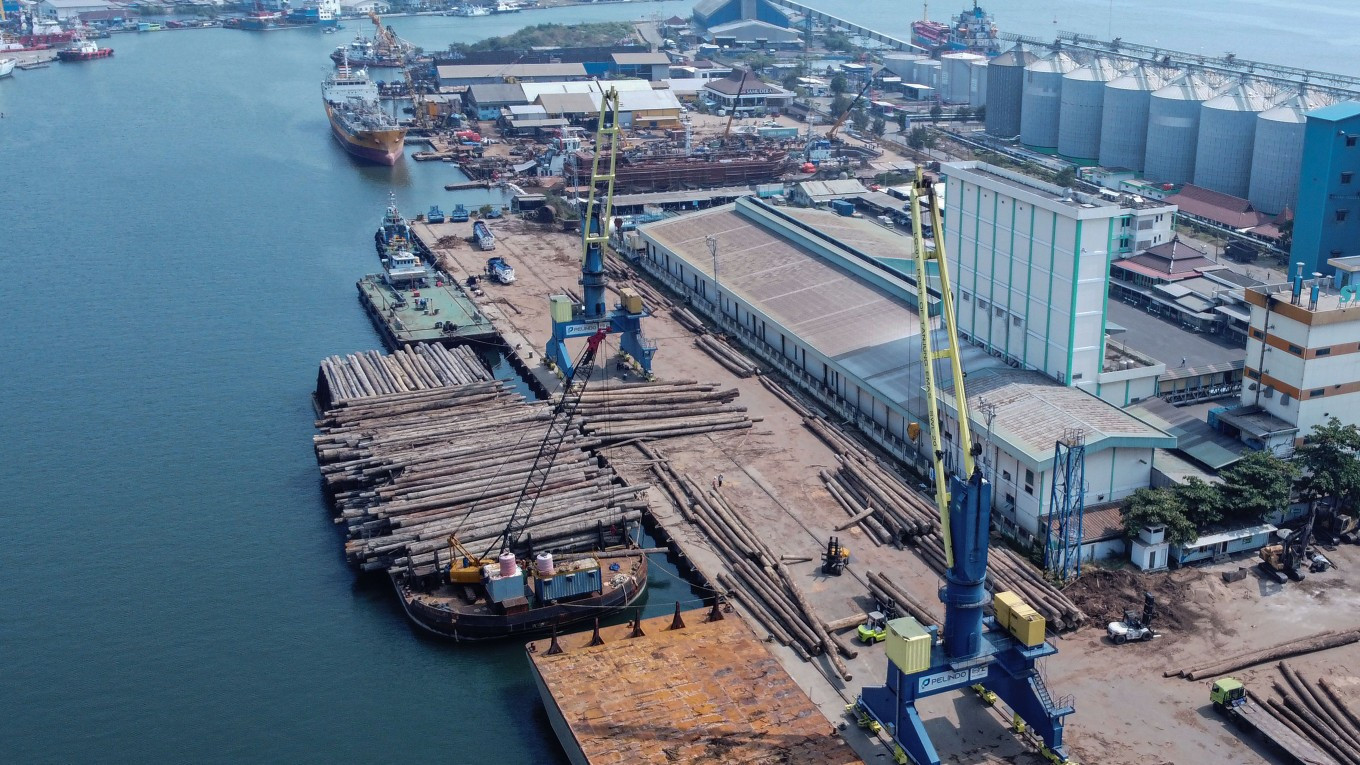News
Jakarta sacrifices domestic market for slight US tariff relief
Tenggara Strategics July 26, 2025 Cranes manage a cargo of logs on May 22, 2024, at Tanjung Emas Port in Semarang, Central Java. (Antara/Makna Zaezar)
Cranes manage a cargo of logs on May 22, 2024, at Tanjung Emas Port in Semarang, Central Java. (Antara/Makna Zaezar)
United States President Donald Trump has announced a 19 percent import tariff on Indonesian goods, down from the original 32 percent disclosed in April. According to him, during negotiations to secure the lower rate, Indonesia agreed to not impose any retaliatory tariffs on US products. Although a tariff rate of 19 percent is still relatively steep, it is lower than the rates many other countries face, giving Indonesian exporters a competitive advantage in the US market. However, some observers have raised concern over the other side of the deal: US goods are now free to enter Indonesia without duties, which some fear could harm local industries.
To secure the tariff reduction, Indonesia made several major concessions including commitments to purchase 50 Boeing aircraft, import up to US$15 billion (Rp 240 trillion) in American goods and buy up to US$4.5 billion in US agricultural products. Trump has hailed the outcome of US-Indonesia tariff talks as a landmark trade deal.
The deal’s agricultural component has drawn strong backlash however, particularly from local dairy and poultry egg producers that are already struggling to compete with the scale and efficiency of US agribusiness. Many local farmers, especially smallholders, worry that they will be unable to keep up, especially if Washington follows through on its proposed export subsidies, such as the exporter tax credit scheme floated earlier this year.
Regardless, the deal does bring tangible advantages for Indonesian exporters. For instance, the US textile market, which was split evenly between imports from Indonesia and Vietnam, has now tilted slightly in Indonesia’s favor. While both countries previously faced the same tariff rate, Vietnam is now subject to a 20 percent tariff, compared to Indonesia’s 19 percent. Though the difference is marginal, even a 1 percent cost advantage can influence buyer preferences and pricing strategies in a highly competitive sector like textiles.
Although the tariffs were originally aimed at foreign exports, their impact is being absorbed across the supply chain. American importers and consumers have begun to face slightly higher retail prices since some of the new tariffs took effect. Nevertheless, US-Indonesia trade volumes remain stable, indicating that Indonesian goods remain competitive in terms of price, especially when compared to imports from countries facing steeper duties. This relative advantage might help Indonesia maintain or even expand its market share in sectors such as apparel, footwear, processed foods and electronics, where small cost differentials can significantly affect purchasing decisions.
The US continues to be Indonesia’s top export destination, and ensuring smooth access to that market is a strategic priority. This is especially relevant given Jakarta’s ongoing enforcement of its policy on export proceeds from natural resources (DHE SDA), which mandates exporters to keep a portion of their foreign exchange earnings in the domestic banking system. This policy is a vital source of Indonesia’s foreign reserves, which help the government maintain monetary stability, manage exchange rates and meet debt obligations. Ensuring steady export flows to the US therefore plays an important role in supporting the country’s broader economic stability.
Indonesia has been working to soften Trump’s tariff policy stance since its introduction on April 2. At the time, the country had only recently joined BRICS, which had become a particular target of the Trump administration due to the US’ significant trade deficits with several members of the bloc. Indonesia initially offered to shift some of its oil imports from Saudi Arabia to the US as a goodwill gesture, but Washington rejected the offer and instead pointed to a key sticking point: Indonesia’s 30 percent tariff on US ethanol.
That tariff rate wasn’t arbitrary, however: It is Indonesia’s standard most-favoured-nation (MFN) rate for ethanol, meaning that it applies equally to all World Trade Organization member states that don’t have a preferential trade agreement with Indonesia. Under WTO rules, the MFN rate is a non-discriminatory baseline tariff extended equally to all members, unless a specific deal is in place. Despite its name, the “most-favoured” designation simply reflects equal, not special, treatment.
The Trump administration has used the same logic to defend its “reciprocal tariff” policy, claiming it is merely imposing tariffs on countries that don’t provide preferential access to US goods. However, critics argue that these tariffs are being wielded as political tools at the cost of a potential global recession, targeting specific countries that are at odds with the Trump administration’s broader strategic goals.

